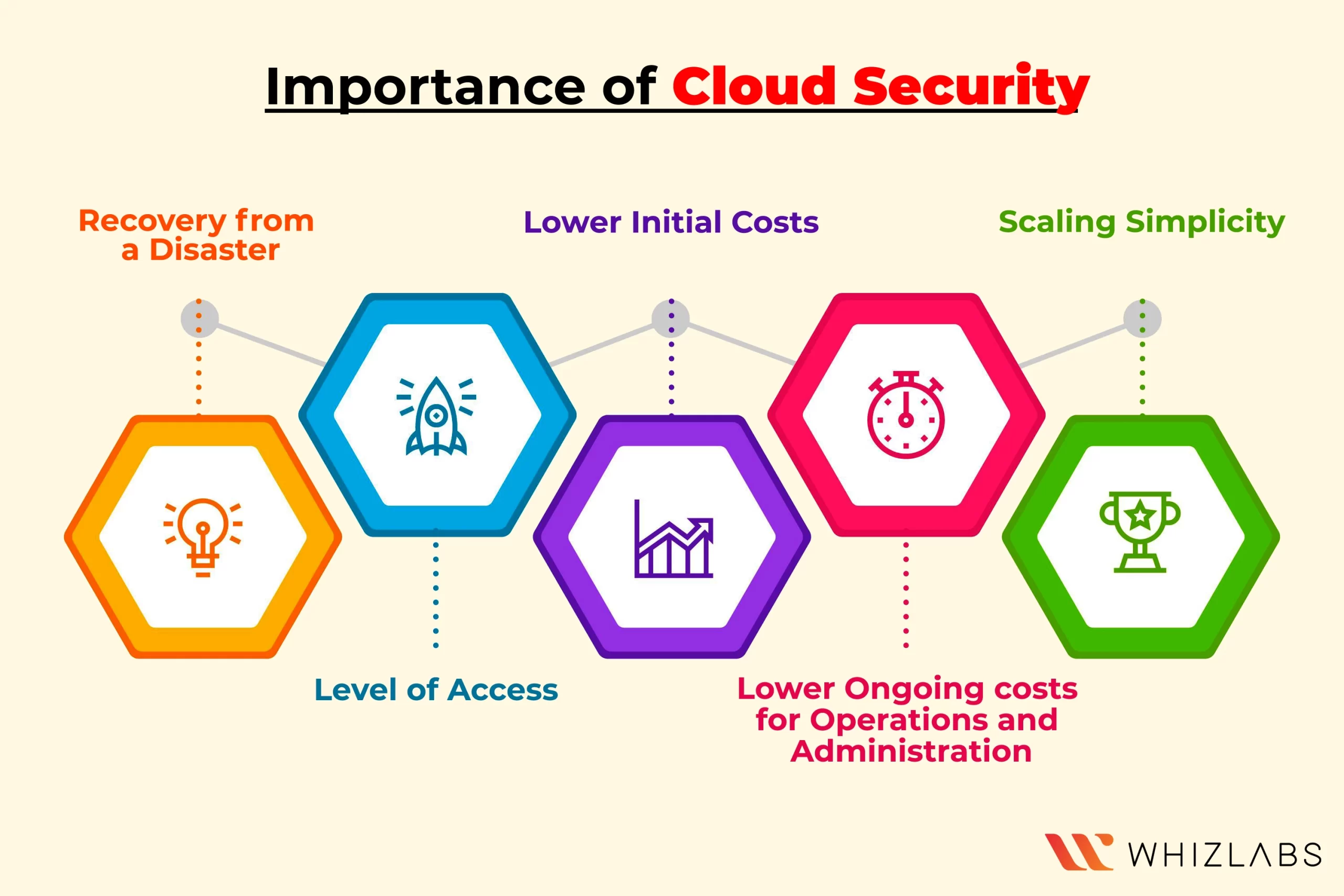Nowadays, everywhere you turn, you hear the term “Cloud”. It becomes a hot topic as this technology continues to grow at a rapid pace and it significantly expands the scope of cloud technology.
You might know that ‘the cloud’ is just a metaphor for the internet and cloud computing were continuously talked about these days.
Even though cloud computing offers numerous benefits such as scalability, flexibility, and cost savings, it also poses significant security challenges that cannot be ignored. The recent arise in cyberattack attacks on cloud infrastructure has increased the importance of cloud security, and it is high time for businesses to prioritize essential security measures.
We already know that the significance of cloud security cannot be overstated, as a single security breach can cause financial losses, reputational damage, and legal issues.
This blog post explores some of the top reasons why data security must be prioritized for your organization and furnished some of the preventive measures you can take to prioritize it in your own business. Whether you’re running a small startup or a large enterprise, it doesn’t matter, cloud security is found to be significant for the success of your organization in today’s interconnected world.
Let’s dig in deeper!
Why do organizations need to prioritize cloud security?
Many businesses completely rely on cloud computing for the execution of day-to-day operations. Due to its popularity, it can be a hot target for cyber-attacks. This puts businesses in a vulnerable position. When a cloud system encounters a cyber-attack, the entire business identity, as well as its reputation, is at risk.
Also Read: Cloud Security– A Complete Guide for Beginners
According to a survey that are made by McAfee, 79% of companies tend to retain thei sensitive data in the public cloud. Cloud databases help organizations, be that of small or large size, operate at a higher scale, manage IT infrastructure effectively, and reduce their capital overheads.
Here are some top reasons why cloud security needs to be prioritized:
Secure client’s personal data
As a company, you are the sole responsibility to secure the personal data of the customers. The personal data may include names, PINs, addresses, Credit card info, and so on. And thus, if any Achilles heel is present in an organization, then the entire data will be at high risk. It means intruders made an attack on that data, which in turn affects data security.
It is significant to pay attention to the customer’s personal data and the organization needs to take a continuous effort in protecting organization data.
In today’s digital world, customers are mainly worried about how their data has been secured and used. And thus it is the foremost responsibility to follow transparency policies to make the client know their rights to access and know how it has been used. Data attacks now become too common, with many firms falling victim to attacks in a regular manner. By data security prioritization, you can be able to become compete with competitors and prove to your clients that you have taken enough steps and measures to maintain their privacy seriously.
Therefore, cloud security measures are essential to building and maintaining customer trust. Companies that invest in cloud security demonstrate their commitment to protecting customer data and privacy, which can help build long-term relationships with customers.
Level up business reputation
Cloud services are critical to the operation of many businesses. A disruption to cloud services could result in downtime, data loss, and revenue loss. Cloud security measures include disaster recovery and business continuity planning, which are significant to ensure that businesses can be able to continue to operate even in the event of a cyber attack or occurence of natural disaster.
Apart from the concerns on customers, the impact of a data breach was high on the business reputation. Is it so? Yes, the customers will lose their trust in your ability to retain their data safely and they go for other business elsewhere. It might significantly lead to revenue loss and reputation damage, which are hard to recover from. By funding more in data security measures, you can protect the reputation of the business and enhance your trust with the customers.
We all might know business reputation is found to be a valuable asset and it takes more years to build. But it gets spoiled within a second by a single data breach.
To put an end to it, organizations must take enough measures to safeguard the data.
Meet regulatory standards
As per the industry type, regulatory requirements may get vary. For instance, the healthcare industry follows HIPAA regulations, while the financial sector act in accordance with PCI DSS requirements. The quirk to meet those standards can have a large impact, like fines and legal action. By means of ensuring cloud security, the company can safeguard assets by adhering to necessary regulatory requirements and cutting off penalties.
Many industries have strict regulations that govern how data is stored, processed, and accessed.
Neglecting regulatory requirements is not only found to be an irresponsible act but also short-sighted. Paying fines and involved in legal action can completely devastate the business and non-compliance costs were found to outweigh the funds spend in applying necessary security measures.
Avoid financial losses
Cyber attacks can make a significant impact on organizational data and cause financial loss for the organization. Besides, the direct costs associated with breaches, picking a cybersecurity firm to make the investigation can indirectly cause revenue loss and client churn. By making investments in data security breaches, you can help to secure organizations from these financial concerns and maintain healthy competitive growth.
The occurrence of financial loss due to a data breach can be found important one to consider but it is not just direct costs you need to worry about. Customers may pick some other companies only if the sensitive data is not well protected.
You might also face the costs that are associated with damage control and remediation, including efforts made by public relations to mend the business reputation. By following security measures, the financial impact on the organization can be minimized and protection will be set from the bottom line.
Foster a culture of security
Prioritizing data security in your organization can help establish a culture of security that places a high value on protecting sensitive information. By making data security a top priority, you can demonstrate to your employees the critical role they play in safeguarding sensitive information and ensuring the success of your business. This can encourage your team to take data security seriously and integrate it into the core values of your organization.
A culture of security is crucial for any organization that handles sensitive data. It’s not just about utilizing advanced security technologies; it’s about ingraining security into the very foundation of your business. By prioritizing data security, you can foster a culture in which everyone takes responsibility for security and recognizes the significance of safeguarding sensitive data.
To enhance the security of the data, it’s essential to invest in robust security measures, such as firewalls, and encryption, antivirus software, and to keep them up-to-date with the latest patches and updates. In addition, it’s important to train the employees on data security best practices and provide them with the necessary resources to safeguard sensitive information.
And to prevent unauthorized access to your data, implement strict access controls and ensure that access is granted only to those who need it. Regularly reviewing and updating your security policies is also crucial, as your organization’s security needs may change as it grows and evolves. By following these steps, you can safeguard your organization’s data and protect it from external threats.
Ways to prevent cyber security attacks
As businesses increasingly rely on cloud services to store and process data, preventing cloud security attacks becomes even more critical. Here are some ways to prevent cloud security attacks:
- Selection of Reliable Cloud Service Provider: Choose a reliable cloud service provider that offers robust security measures and adheres to industry standards and compliance regulations. Look for providers that offer multi-factor authentication, encryption, and network segmentation.
- Use Strong Passwords: Ensure that all cloud accounts and access to cloud services use strong, unique passwords that are changed regularly. Multi-factor authentication can adds up high layer of security.
- Encrypt Data: Encrypting the sensitive data both at rest and in transit to protect it from unauthorized access. Use industry-standard encryption protocols to ensure data confidentiality and integrity.
- Implement Access Controls: Applying strict access controls and ensure that access is granted only to authorized personnel. This can include the use of firewalls, access controls, and intrusion detection systems.
- Regularly Monitor for Suspicious Activity: Regularly monitor cloud services for suspicious activity, such as unauthorized access attempts or unusual data transfers. This can help identify potential security threats before they cause significant harm.
- Use Cloud Security Tools: Employing security tools such as intrusion detection systems, vulnerability scanners, and threat intelligence platforms to identify and address security threats.
- Train Employees: Provide regular training to employees on cloud security best practices, such as how to identify phishing emails, how to use strong passwords, and how to report suspicious activity.
By implementing these cloud security best practices, businesses can significantly reduce the risk of cloud security attacks and protect their data and systems from unauthorized access and damage.
Top Cloud Security Challenges
As cloud computing continues to grow in popularity, businesses will face several cloud security challenges in 2024. Here are some of the most significant challenges:
- Security Threats: As more and more data is moved to the cloud, the risk of cyber-attacks and data breaches increases. In 2024, security threats will continue to be a significant challenge for businesses using cloud services. Cybercriminals are becoming increasingly sophisticated in their tactics, making it even more challenging to protect cloud infrastructure and data.
- Compliance: With more data being stored and processed in the cloud, compliance with industry regulations will become even more critical in 2024. Organizations need to ensure that their cloud services comply with regulations and take necessary measures to protect their data and applications.
- Multi-Cloud Complexity: Multi-cloud environments, where businesses use more than one cloud provider, are becoming increasingly common. Managing multiple cloud services and ensuring consistent security across them can be a significant challenge.
- Insider Threats: In this threat, employees or contractors intentionally or unintentionally causing harm to the cloud infrastructure, will remain a significant challenge in 2024. It can be difficult to detect and prevent insider threats, making it essential to have a robust security plan in place.
- Zero Trust Security: Zero trust security, which assumes that no one is trusted, and everything is verified, will become more critical. With this approach, businesses can better protect their cloud infrastructure by implementing strict access controls and continuously monitoring for potential threats.
FAQs
Summary
Cloud security is clearly essential to ensure the protection of your organization’s private data, accounts, and identities. Organizations must recognize the importance of securing their data in the cloud and take comprehensive measures to safeguard against potential security threats.
By prioritizing cloud security, businesses can effectively protect their assets and maintain a secure and resilient IT environment in today’s digital landscape.
Having any doubts on this blog? please feel free to contact us!
- Study Guide DP-600 : Implementing Analytics Solutions Using Microsoft Fabric Certification Exam - June 14, 2024
- Top 15 Azure Data Factory Interview Questions & Answers - June 5, 2024
- Top Data Science Interview Questions and Answers (2024) - May 30, 2024
- What is a Kubernetes Cluster? - May 22, 2024
- Skyrocket Your IT Career with These Top Cloud Certifications - March 29, 2024
- What are the Roles and Responsibilities of an AWS Sysops Administrator? - March 28, 2024
- How to Create Azure Network Security Groups? - March 15, 2024
- What is the difference between Cloud Dataproc and Cloud Dataflow? - March 13, 2024

